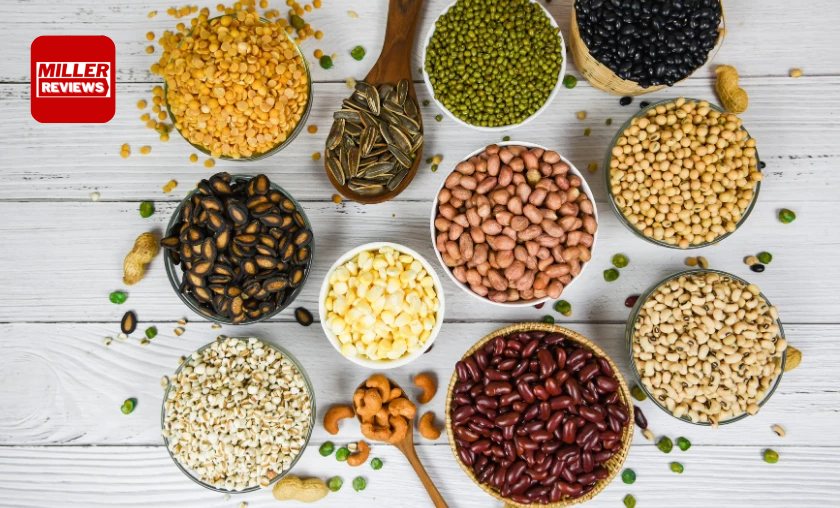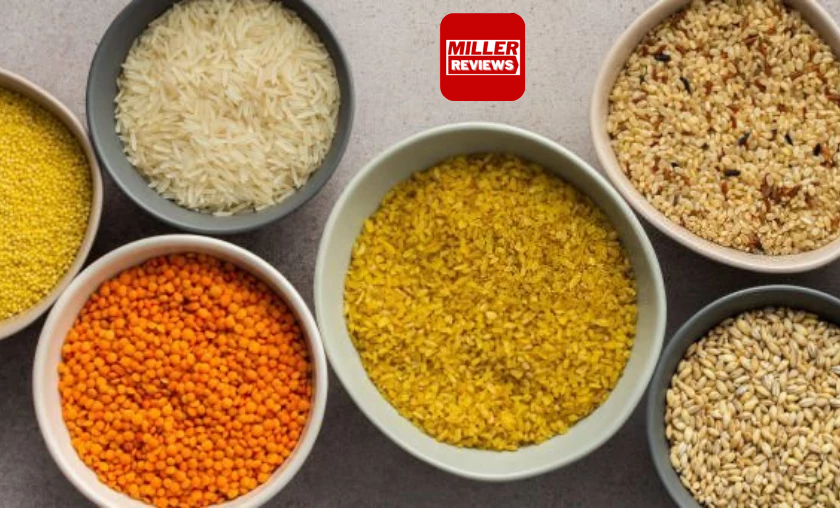Welcome! dear in the truth about grains, to “The Truth About Grains! A Comprehensive Guide.” I, am here to unravel the mysteries surrounding these tiny but mighty food staples. Oh, the power of grains! They’ve been a part of our diets for centuries, nourishing civilizations and inspiring countless culinary creations. But amidst the noise of modern dietary trends and conflicting information, it’s time to separate fact from fiction.
In this comprehensive guide, we will dive deep into the world of grains, uncovering their nutritional benefits, exploring the different types, and dispelling any myths that might be clouding your understanding. So, let us embark on this enlightening journey together and uncover the truth about grains!
Table of Contents
The Truth About Grains
Good Grains:

Growing up, we were constantly reminded by the food pyramid that grains should dominate our daily diet. But times have certainly changed! With the emergence of new research, the USDA has shifted from the food pyramid to the “My Plate” approach, which significantly reduces the recommended intake of grains.
It’s crucial to understand that not all grains are created equal! When it comes to choosing the right grain for your diet, it’s important to consider that some grains are superior to others. These exceptional grains are often referred to as “Ancient or Heritage Grains,” and they include remarkable options like quinoa, amaranth, barley, teff, millet, sorghum, and several others.
The beauty of these grains lies in their pure, unaltered state, untouched by genetic modification or deviations in planting and growing practices. They retain their original essence and pack a powerful punch of vitamins, minerals, proteins, and even omega-3 and B vitamins.
Why Moderation
Let me define you something, even though we often consider grains to be a healthy choice, they don’t pack as much nutritional value as some other foods out there. Take leafy green vegetables, for instance. These bad boys are true powerhouses when it comes to vitamins and minerals. And wait to get me started on lean meats like fish and poultry. They’re bursting with essential vitamins, minerals, and protein that your body needs.
Here’s the thing about grains: they have this tendency to expand in your stomach, making you feel full with a lot less. That’s a good thing, but here’s the catch. When consuming fewer grains, you also absorb fewer nutrients into your body. So, even if you’re feeling satisfied, you’re getting fewer valuable nutrients your body craves. It’s something worth considering when you’re making choices about what to put on your plate.
Non-so-Good Grains:

Now, let’s talk about those “not-so-good” grains that many of us are familiar with corn, rice, and wheat. Sure, they may be the most commonly produced and consumed grains in the good ol’ US of A, but they need to catch up when it comes to nutritional value. Unfortunately, these grains don’t offer the same level of nourishment as some of their counterparts.
Here’s an eye-opening fact for you: in half of the world, bread alone provides over 50% of the average person’s daily caloric intake. Can you believe that? It shows how heavily reliant some diets are on grains. But here’s the kicker: primarily grain-based diets often end up lacking or completely deficient in a crucial vitamin known as B12. And let me define you, that’s not a good thing.
When your body doesn’t get enough vitamin B12, it can lead to a condition called megaloblastic anemia. This type of anemia can bring along some not-so-pleasant consequences, such as cognitive dysfunction and an increased risk for arterial vascular disease and thrombosis, which are fancy terms for blood clots. So, relying too heavily on these common grains can have some serious health implications. It is something one to keep in mind when making choices about your diet.
Leaky Gut Link:

Leaky gut syndrome occurs when gaps develop between intestinal cells, allowing undigested food, waste, and bacteria to leak into the bloodstream. It can be linked to inflammatory bowel diseases like Crohn’s and ulcerative colitis.
Research at Colorado State University suggests that humans weren’t designed to consume grains, which may contribute to the leaky gut syndrome. Dr. Loren Cordain believes that nutritional needs can be fulfilled through other food sources. The high-fiber bran in grains, considered whole grains, contains anti-nutrients that can be pro-inflammatory and disrupt various bodily systems, including the immune, nervous, cardiovascular, and endocrine systems. In essence, grains can be toxic to multiple body systems.
Natural vs. Organic:

Let’s talk about grains and the significance of marketing words that often appear on their labels. It’s crucial to grasp the distinction between terms like “natural” and “organic” because they are not interchangeable. When a product is labeled as “100% Organic,” it means that it contains solely organically grown ingredients.
On the other hand, a label stating “Certified Organic” allows for the inclusion of up to 5% of non-organic, synthetic, modified, or other unnatural ingredients. Lastly, when you come across labels that say “Made with Organic Ingredients,” you can expect 70-95% of the ingredients to be organic. So, it is important to be aware of these variations and understand what each label truly means.
Natural means a variety of things, including:
- The producer used carcinogenic fumigants or chemical solvents.
- The producer used toxic pesticides or genetically engineered ingredients.
- It does not mean “non-GMO,” and it does not mean “organic.”
Chiropractic Factor/Recommended Diet:

If you are considering to make a change to your family’s diet, I’ve got some simple tips & tricks for you to keep in mind:
- Consider the Paleo Diet: This dietary approach encourages the consumption of natural and non-processed foods. Remember, the less packaging involved, the more natural it tends to be.
- Focus on the Right Foods: Make sure to include grass-fed meats, fish/seafood, fresh fruits & vegetables, eggs, nuts & seeds, & healthful oils such as coconut, olive, flaxseed, and avocado in your family’s meals.
- Say No to Certain Foods: It’s best to avoid grains, legumes, dairy, refined sugar, potatoes, salt, hydrogenated oils, and all processed foods. They don’t align with the principles of a wholesome diet.
Here’s another suggestion: If you’re curious and eager to learn more about improving your family’s diet, why not consult Dr. Elyssa during your next appointment? She can assist you in starting a food diary and determining which aspects of your system require nutritional support.
Remember, small changes can make the big difference when it comes to your family’s health & well-being.
Conclusion
I hope this comprehensive guide has shed light on the truth about grains. We’ve explored their nutritional value, the potential impact on conditions like leaky gut syndrome, and the importance of understanding marketing terms regarding grain products. Whole grains have been a dietary staple for many; making informed choices based on your health goals and individual needs is important.
Whether you choose to incorporate ancient grains, explore alternative food sources, or even consider a Paleo-inspired approach, remember that the key lies in balance and mindful consumption.
By understanding the facts, you can make empowered decisions about the role of grains in your diet, promoting optimal health for you and your family.
FAQs
Are all grains created equal, or are some better than others?
Absolutely! Not all grains are equal in terms of nutritional value. Some grains, known as “ancient or heritage grains,” like quinoa, amaranth, barley, teff, millet, and sorghum, offer a higher nutritional profile, loaded with vitamins, minerals, proteins, and even omega-3s and B vitamins.
Can grains contribute to conditions like leaky gut syndrome?
Yes, there is evidence to suggest that grains, particularly those containing high-fiber bran portions, may trigger or exacerbate leaky gut syndrome.
These bran portions can contain anti-nutrients that have the potential to be pro-inflammatory and disrupt various bodily systems, including the immune, nervous, cardiovascular, and endocrine systems.
Should I avoid all grains altogether?
It depends on your individual health goals & needs. While some individuals may choose to eliminate grains from their diet, others may find that certain grains can be enjoyed in moderation without adverse effects.
Listening to your body & making choices that align with your specific dietary requirements is essential.
What is the Paleo Diet, & does it recommend avoiding grains?
The Paleo Diet is the dietary approach that emphasizes natural and non-processed foods, similar to what our ancestors would have consumed.
It does advocate for the avoidance of grains, as well as legumes, dairy, refined sugar, potatoes, salt, hydrogenated oils, and processed foods. The focus is on consuming grass-fed meats, fish/seafood, fresh fruits and vegetables, eggs, nuts and seeds, and healthful oils.
How can I make healthier choices when it comes to grains?
Opting for whole grains over refined grains is a good starting point. Whole grains retain more of their natural nutrients and fiber. Additionally, considering alternatives like ancient grains can offer a wider range of nutritional benefits.
Remember to balance your diet with a variety of nutrient-rich foods, including vegetables, lean proteins, & healthy fats, to create a well-rounded & nourishing meal plan.
For More amazing articles related to Health Check out our website Over Here
To Read more similar articles click here
Thanks for visiting our Website. If you appreciate our work, kindly show us some support in our comments section 🙂